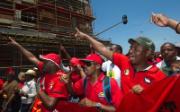
THE Congress of South African Trade Unions (Cosatu) seems willing to try to put itself back together again. If it does somehow pull this off, it will mean little unless it can also find ways to stop becoming that which it was formed to change.
Last week’s Cosatu central executive meeting defied most forecasts: instead of the predicted sacking of general secretary Zwelinzima Vavi, which would have further deepened divisions, its leaders emerged promising a peace process, including talks with the expelled National Union of Metalworkers of SA (Numsa). The reason is surely that the African National Congress (ANC) task team under Deputy President Cyril Ramaphosa has convinced unions, at least for now, that the costs of a split will outweigh the benefits. And so a new attempt will be made to find a way in which warring unions can live with each other in the same federation.
The odds are stacked against the unity process. The hostility between Numsa and its supporters and those who want it out runs deep — a unity agreement would require a willingness to tolerate these differences, which has not been evident in Cosatu since its divisions over whether to support Jacob Zuma for president.
But the potential costs of disunity to Cosatu and its unions are huge: if Numsa does not return, the likeliest result is two federations fighting for the same members. While that might revitalise labour relations in the longer term, the damage to the ANC and to unions will be extensive. So, while Cosatu’s unions find it difficult to live together, they may be unwilling to pay the price of living apart.
Wherever unity talks lead, the union movement will need more than a peace deal to restore it to health: the conflict that prompted Numsa’s expulsion is a symptom of deeper problems that unions will need to address if they are to serve their members and society.
Unions were formed to ensure that working people enjoyed a greater share in the benefits which the economy produces — and more say in the decisions that affected them. And so they are meant to be an antidote to a balance of economic power in which a few decide for everyone else and keep the benefits of growth for themselves. This was particularly important here, as the economy before 1994 was the preserve of a small exclusive club that took all the decisions and reaped all the benefits.
For years, unions won for working people a say in their pay and work conditions and also provided a platform for workers to express themselves on the policies and practices that shaped their lives — opinion surveys showed that, by the mid-1990s, union members were clearer than many other groups about what they did and did not want and were better able to express themselves. This wasn’t because they were any better or worse than anyone else — it was a sign of what people could achieve if they organised and fought for a say. Unions were a challenge to the exclusive club because they enabled many more people to share in the fruits of growth and to join the discussion on where the economy and the country should go.
But, some years ago, it became clear that union leaders were becoming that which they had been formed to resist — that instead of demanding that the club admit many more members, they were joining it.
Research shows that, for many in leadership positions in unions, unionism became a route into the boardrooms and the affluent world that unions had once challenged. But these benefits that leadership brought were not available to union members.
The present conflicts in unions are a consequence. The argument about whether to move closer to the ANC is not just a dispute over political strategy, it is also about access to leverage that may bring economic goodies. Internal union disputes become overheated — prompting, in some recent cases, killings — because access to the lifestyle the club offers is at stake. And unionists become less inclined to listen to their members because the gap between their respective worlds is too great.
Unions’ loud opponents may react to all of this with glee, dismissing union leaders as "fat cats" and "labour barons". But the union leaders didn’t create the club — they simply joined it. The tension we see in the workplace was not created by the unions but by the failure of all our economic actors to begin to negotiate us out of an economy and society in which the enterprise and energy of many is still not recognised.
But that does not let union leaders off the hook — they were meant to challenge the club, not join it. Until they begin to do that, they will face huge pressures from within and without.
If Cosatu is to begin to heal itself, it must agree that political differences will be tolerated. But it needs also to tackle the gap between leaders and members that lies at the heart of its present troubles. If it ducks the issue, unions will remain plagued by strife — and by an ever-widening gap between their leaders and working people.
By Steven Friedman
Cosatu. Picture: REUTERS
Source: Business Day website
Friedman is director of the Centre for the Study of Democracy.
